- Home
- Raymond E. Feist
Exile's Return: Conclave of Shadows: Book Three Page 7
Exile's Return: Conclave of Shadows: Book Three Read online
Page 7
As Kaspar had lived with the porters and teamsters for a week, they answered his questions and he had learned a great deal about the local area. To the east lay the Serpent River and beyond that the wasteland controlled by the nomadic Jeshandi; it seemed they had no interest in what occurred on this side of the river. But across the Serpent they ruled supreme; even the Emerald Queen’s army had been sorely pressed on that flank by the Jeshandi. Kaspar had read reports of the war from his father’s archives when he was a boy and given the immense size of the Queen’s army, Kaspar assumed the Jeshandi had to be a formidable cavalry to have avoided obliteration.
To the west rose the Sumanu Mountains and beyond them vast grasslands that rolled down to the River Vedra and a string of petty city-states. That natural barrier protected the Raj from conflict to the west. To the south, other minor nobles and self-styled rulers held territory, but from the rumors, the Raj was already halfway to winning a happy little war with one of his neighbors in that direction.
But far to the south, on the coast of the Blue Sea, lay the City of the Serpent River, about which these locals knew little. Once, it had held sway from the sea all the way up to the Serpent Lake, and had been ruled by a council of clans indigenous to the area. More than that, Kaspar didn’t know. Still, that was where ships docked, some from as far away as the Sunset Isles, the southern Keshian cities, and sometimes even Queg and the Kingdom. Which meant a way home for Kaspar. So, that was where he was bound, war or no war.
The wagons continued to bump along and Kaspar kept his eyes scanning the horizon in case trouble appeared unexpectedly. He thought it was unlikely, as the farther south they traveled from Muboya, the more peaceful the countryside seemed. At least, until they ran into the rumored war.
Kaspar sat at the rear of the wagon. The only thing he had to watch, besides the horizon, was the team of horses pulling the wagon behind his, and the dour expression of Kafa: a taciturn old driver with little good to say when he said anything at all.
The driver of his wagon was a voluble man named Ledanu, whom Kaspar tended to ignore, since his words tumbled out aimlessly as his mind wandered. Still, Kaspar had grown tired of the relative silence and judged he could endure a little of Ledanu’s rambling if he could glean a bit of useful information from among the flood of words.
“Tell me, Ledanu, of this next city.”
“Ah! Kaspar, my friend,” said the little man, eager to impress his new wagon mate with his expertise. “Simarah is a most wonderful place. There are inns and brothels, baths and gambling houses. It is very civilized.” Kaspar sat back and endured a torrent of details about the establishments that Ledanu found most convivial in each aforementioned category. Kaspar realized that any useful intelligence, such as the disposition of soldiers, the politics of the region, its relationship with neighboring cities and such would be lacking. Still, it was useful to hear something about the place, as it would be Kaspar’s next home until he could conspire to find a way south again.
Kaspar leaned against the doorway, waiting to see if anyone would appear this morning requiring laborers. It was traditional for those seeking day-labor to meet before sunrise in a small market near Simarah’s north gate. Kaspar had found work every morning for the first week after arriving in Simarah, and the pay was better than it had been in Muboya.
There wasn’t a full-scale war underway as yet, but some sort of border skirmish was developing down south, between Muboya and the realm of someone calling himself the King of Sasbataba. Soldiers were being recruited, and because the pay was relatively good, most workers were taking up arms. So Kaspar had been constantly employed. He had also rediscovered his gambling luck, and so had enough coin in his purse to feed himself for another week should work stop. He could also afford a room—little more than a cot under the stairs—at a local boarding house. He ate simple food and didn’t drink, so he actually ended each day with a little more wealth than he had at the start.
He had hoped for another caravan to pass through the town, heading south and that he could again find a position as a guard, but during the conflict with King Sasbataba, all supplies and goods heading south were under strict military escort. A sense of urgency was overtaking him as he waited to continue his journey home.
Three men approached the market and all the workers came to their feet expectantly. Kaspar had seen these three before over the last few days. The first two always hired about two dozen men between them, but the third had lingered for a while, looking closely at the men in the area, as if searching for some unseen quality, and had then departed alone.
The first man shouted, “I need three pickers! Experienced orchard men only!”
The second said, “I need strong backs! I’ve got cargo to load. Ten men!”
But the third man simply walked past those racing to present themselves to the first two men hiring, and approached Kaspar. “You there,” he said, his words colored by a strange accent. “I’ve seen you here for a few days.” He pointed to the sword at Kaspar’s side. “Know how to use that thing?”
Kaspar smiled, and it wasn’t friendly. “If I didn’t, would I be standing here?”
“I need a man who can use a sword as well as having other talents.”
“What talents?”
“Can you ride?”
Kaspar studied his would-be employer and realized this man was dangerous. Whatever he was about to suggest was probably illegal, and if so, Kaspar stood to make good money from doing it. He studied the man’s face for a moment and found little in it to recommend itself. He had a thin nose that made his dark eyes look too close together. His hair was oiled and combed flat against his head, and his teeth were yellow and uneven. His clothing was of a fine weave, if simply cut, and Kaspar noticed that his dagger had an ivory handle. But the most noticeable thing about the man was his expression, one of fatigue and worry. Whatever he needed done would undoubtedly be dangerous, and that might mean a healthy wage. After considering the question, Kaspar said, “As good as some, better than most.”
“I can’t place your accent. Where are you from?”
“A lot of places, most of them very far from here, but most recently up north, around Heslagnam and Mastaba.”
“You’re not from the south?”
“No.”
“Any problem with having to fight?”
Kaspar was silent for a moment, as if considering his answer. He knew that if a horse was involved in the bargain, he was taking the job, no matter what the task; he didn’t plan on returning to Simarah in this lifetime. If he didn’t like the job, he’d steal the horse and ride south. “If the job is to fight, I’m no mercenary. But if you mean can I fight if I need to, yes, I can.”
“If things go as planned, you only need to be able to ride, my friend.” He motioned for Kaspar to follow him. As he walked away, he said, “My name is Flynn.”
Kaspar stopped in his tracks. “Kinnoch?”
Flynn spun around and spoke in the language of the Kingdom of the Isles. “Deep Taunton. You?”
“I’m from Olasko.”
Flynn glanced about and in the King’s Tongue said, “Then we’re both far from home, Olaskon. But this may be the gods’ way of providing us both with what we need, because unless I’m sadly mistaken you didn’t just decide to come down here to this godforsaken side of the world out of choice. Follow me.”
The man named Flynn hurried along a series of streets in the seedier part of the merchants’ quarter, then turned down a long alley. Kaspar kept his face immobile and tried to maintain a calm demeanor, but his heart raced. Flynn had been the surname of one of his boyhood instructors; a man from a region known as Kinnoch, part of a nation long ago overrun by the Kingdom of the Isles. But the inhabitants had retained their strong cultural identity and still spoke a language used only among their community. Kaspar’s instructor had taught him a few phrases, to indulge a curious boy, but even that much would have been considered a betrayal by other clan members. The men of Kinnoch were
redoubtable fighters, poets, liars, and thieves; prone to drunkenness, sudden bursts of rage, and deep sorrow, but if this man had found a way to this godforsaken side of the world, he might well have the means to return to civilization.
Flynn entered a warehouse which looked drafty, dusty, and dark. Inside, Kaspar saw two other men waiting. Flynn stepped to one side and nodded, and without warning the other two men drew their swords and attacked.
SIX
OPPORTUNITY
Kaspar leapt to his right.
Before his attacker could react, Kaspar had drawn his sword and spun round to deliver a crushing strike to the man’s back.
Flynn’s blade scarcely blocked the blow as he shouted, “Enough! I’ve seen enough.” He still spoke the King’s Tongue.
Kaspar took a step back as the other two men did likewise. Flynn quickly resheathed his blade and said, “Sorry, my friend, but I had to see if you really could use that thing.” He pointed to Kaspar’s blade.
“I said I could.”
“And I’ve known women who said they loved me, but that didn’t make it true,” countered Flynn.
Kaspar kept his blade out, but lowered it. “You have a problem with trust, it seems.”
Flynn nodded, a wry smile on his lips as he said, “You’re observant. Now, forgive me, but we had to be sure you’d wits enough for trouble at any time. These lads wouldn’t have killed you, just cut you up a little if you hadn’t been able to defend yourself.”
“Your test almost got your friend here crippled for life,” said Kaspar, as he pointed to a wiry man with shoulder-length blond hair who was not amused by Kaspar’s observation. He said nothing, but his blue eyes narrowed. He nodded once at Flynn.
The third man was broad-shouldered, thick-necked, and covered with hair everywhere, except for his balding pate. He laughed; a short bark like a dog’s. “It was a good move, I’ll grant.”
Kaspar raised an eyebrow and said, “You’re a Kinnockman, or my ears have never heard that accent.”
The blond man said, “We’re all from the Kingdom.”
“I’m not,” said Kaspar. “But I’ve been there.”
The two men looked inquiringly at Flynn, who said, “He’s from Olasko.”
“You’re even farther from home than we are!” observed the blond man.
“I’m McGoin, and he’s Kenner,” said the burly man.
“I’m Kaspar.”
“So, we’re four kindred spirits; men of the north.” Kenner nodded sagely.
“How did you get here?” asked Kaspar.
“You first,” urged Flynn.
Kaspar thought it best to hide his identity. These men might think him a liar, or they might seek to use such knowledge to their benefit and his disadvantage in the future. Mostly, he decided that his former rank hardly mattered now; he was on the wrong side of the world and had been stripped of his title and lands. He might tell them more, later, after he had heard their tale.
“Nothing very fancy, really. I got on the wrong side of a magician who has enough power to relocate the people who annoy him. One minute I’m in Opardum, the next I’m up near Heslagnam with half a dozen Bentu riding toward me.”
“You got away from Bentu slavers?” asked McGoin.
“No,” said Kaspar. “First they caught me; then I escaped.”
Flynn laughed. “Either you’ve a touch of magic yourself, or you’re enough of a liar to be a Kinnockman.”
“I haven’t that honor,” said Kaspar.
“Magicians,” observed Kenner. “They’re a curse, no doubt.”
“Well, that one certainly was,” said Kaspar. “Still, he could have landed me halfway across the ocean and let me drown.”
“True,” said Flynn.
“Now, your story.”
“We’re traders out of Port Vykor,” began Flynn.
Instantly Kaspar knew Flynn was lying. It was far more likely that they were pirates out of the Sunset Isles.
“We were a consortium put together by a trader out of Krondor, name of Milton Prevence. When we reached the City of the Serpent River we found a clan war underway. We couldn’t even come into port, because two clans were battling over who controlled the harbor.
“So, we turned around and looked for a landing.” He pointed to his companions. “There were thirty of us when we started.”
Kaspar nodded. “A few merchants and how many guards?”
Flynn shook his head. “None. We are traders, but all of us have learned to take care of ourselves. McGoin started off as a felter’s apprentice, and got into the wool trade. From there it was fine clothing, and the silks you can buy down here are the best he’s seen, even better than from Kesh.
“Kenner’s specialty is spices, the rarer the better. Me, I specialize in gems.”
Kaspar nodded. “All highly transportable and not too bulky, save for the silk.”
“But it’s light,” said McGoin. “You can pack the hold of a ship and she’ll barely lower a yard on the waterline.”
“So what happened?”
Kenner took over the narrative from Flynn. “We had two choices. We could have turned west and sailed on to the City of Maharta to trade up the Vedra River; lots of commerce, lots of exotic goods, but also, lots of crafty traders and less advantageous deals.”
“What was the other choice?” Kaspar asked.
“There’s a place where the Serpent River loops to the east, almost reaching the coast. It’s less than a week’s walk from the beach to the river, so we didn’t bring horses—we’d just buy them here if we needed to ride. At the river there’s a town called Shingazi’s Landing. Used to be a small trading post, but now it’s a good place to catch a ride upriver.”
McGoin added, “So, that’s what we did; we hired a boat and set upriver, figuring there’d be goods up there no Islesman had ever seen before.”
Flynn laughed. “Talk about gods cursed arrogance. We’re not faint-hearted men, Kaspar, but there were thirty of us when we started and all of us knew how to take care of ourselves.
“But the farther north we traveled, the madder things became.”
“How long have you been here, Kaspar?” asked McGoin, interrupting the story.
“Six, seven months. I’ve lost track.”
“How far north did you go?” asked Flynn.
“Mastaba.”
“Then you didn’t get close to the Serpent Lake,” said Flynn. “That area’s a no man’s land. There are these nomads—”
“The Jeshandi. Yes, I’ve heard of them.”
“They prevent anyone settling around the lake, but there are other people up there, too. To the south of the lake rise the Sumanu mountains, and that’s where we—”
“Start at the beginning, Flynn,” said McGoin.
Flynn took a deep breath, as if preparing to tell a long tale. “We found a riverboat at Shingazi’s Landing, a well-built craft with a wide-keel and shallow-draft; the kind you could walk the deck with poles and haul with ropes when need be.
“The captain explained that there were no significant ports until a town called Malabra, which was as far north as he would sail, but he’d sell us the boat. Several of us had some riverboat experience so we felt confident that by the time we reached Malabra we’d have everything sorted out. We agreed that Prevence would be the commander of the entire expedition and that a man named Carter would act as boat-captain upon leaving Malabra.
“The trip up to Malabra took three months. Everything seemed fine for a while. Then, we hit some weather and had to shelter on the shore. A couple of days later, we encountered bandits, who stalked us for five days on horseback while we struggled to stay midstream. They took three men with arrows before giving up.”
Kenner said, “We should have known. We hadn’t found one decent trading opportunity and we’d already lost three lives; we should have known…”
“But we carried on,” continued Flynn. “By the time we got to Malabra, two more men had died from fever.” He p
aused, as if trying to remember. “We did all right, at first. We set up a trading post, in a warehouse not unlike this one. The language wasn’t that difficult, because we had a dozen men who could speak Quegan, and the two dialects are similar. It was around that time things started to—” He looked at his companions, as if asking for help.
McGoin said, “Some of the local people started bringing items to the warehouse to sell to us. We were carrying plenty of gold—a fair amount by Kingdom standards, but a royal treasury here. I expect you’ve noticed their lack of coinage; it looks like they’re still paying the price of that war my father fought in.
“But, the things they brought in…well, at first we thought they were just—what’s the word?” He looked at Kenner.
“Artifacts.”
“Ya, that’s it,” said McGoin. “From some long-dead civilization—these things were really old.”
“What kind of things?” asked Kaspar, now caught up in their story.
“Some of them were masks, like those temple priests wear in festivals, but like nothing we’ve ever seen. Animal faces, and other creatures—well, I don’t know what they were. And jewelry; lots of it. Some of it was pretty ordinary, but other pieces…” He shrugged.
Flynn continued. “I’ve traded in gems all my life, Kaspar. I’ve seen common baubles and gifts fit for the Queen of Isles, but some of these pieces!”
“Why were they willing to trade such valuable trinkets for gold?”
“Imagine a farmer owns a necklace which is worth a lifetime’s toil—but he can’t sell it, trade with it, or eat it—it might as well be a bucket of dirt,” said McGoin. “But he can spend a bag of coins a little at a time and buy what he needs for years.”
“So we bought all the jewelry,” said Flynn.
“Tell him about the ring,” said Kenner.
Kaspar looked around the warehouse and saw a stack of empty bags, waist high, so he went over and made himself comfortable. Flynn said, “We had some rings brought in. Some were gold, but most weren’t. Some were set with gems, and a few were of really good quality. But a lot of them were plain metal bands with odd markings on them.”

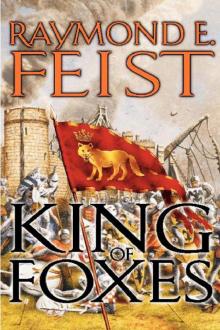 King of Foxes
King of Foxes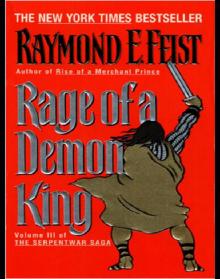 Rage of a Demon King
Rage of a Demon King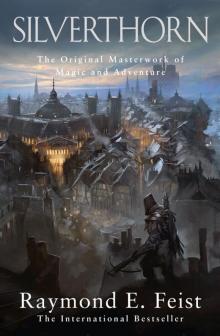 Silverthorn
Silverthorn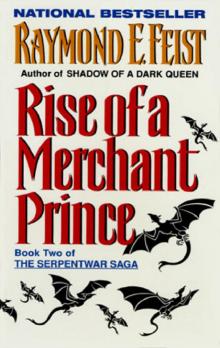 Rise of a Merchant Prince
Rise of a Merchant Prince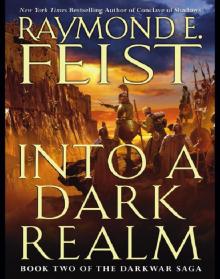 Into a Dark Realm: Book Two of the Darkwar Saga
Into a Dark Realm: Book Two of the Darkwar Saga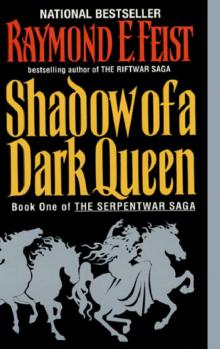 Shadow of a Dark Queen
Shadow of a Dark Queen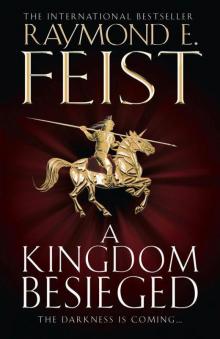 A Kingdom Besieged
A Kingdom Besieged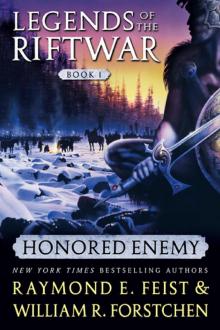 Honored Enemy
Honored Enemy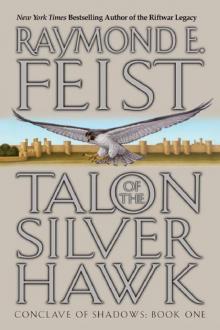 Talon of the Silver Hawk
Talon of the Silver Hawk The Complete Legends of the Riftwar Trilogy
The Complete Legends of the Riftwar Trilogy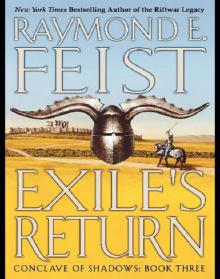 Exile's Return: Conclave of Shadows: Book Three
Exile's Return: Conclave of Shadows: Book Three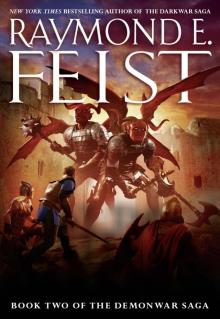 At the Gates of Darkness
At the Gates of Darkness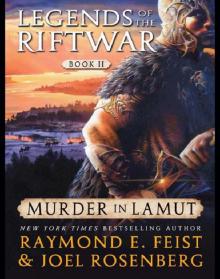 Murder in LaMut: Legends of the Riftwar: Book II
Murder in LaMut: Legends of the Riftwar: Book II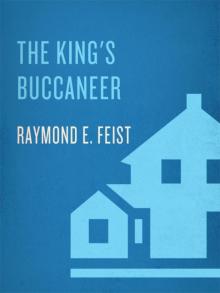 The King's Buccaneer
The King's Buccaneer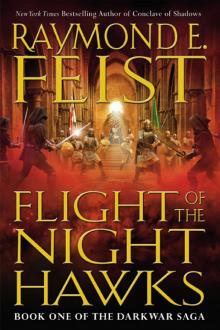 Flight of the Nighthawks
Flight of the Nighthawks The Riftwar Saga
The Riftwar Saga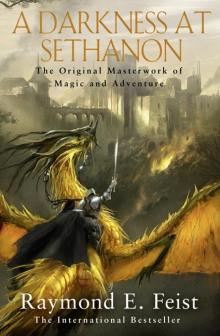 A Darkness at Sethanon
A Darkness at Sethanon Magician: Master
Magician: Master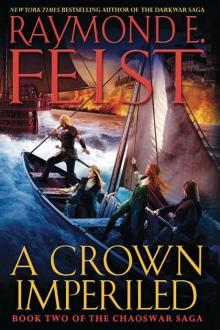 A Crown Imperiled
A Crown Imperiled Magician: Apprentice
Magician: Apprentice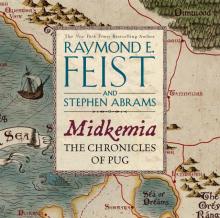 Midkemia
Midkemia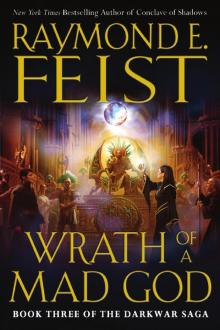 Wrath of a Mad God
Wrath of a Mad God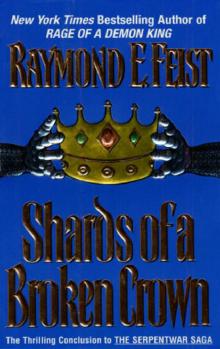 Shards of a Broken Crown
Shards of a Broken Crown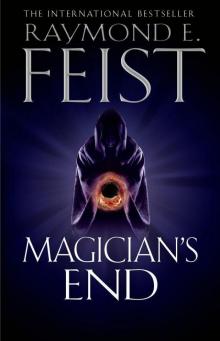 Magician's End
Magician's End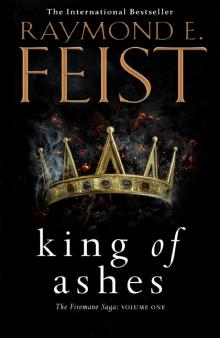 King of Ashes
King of Ashes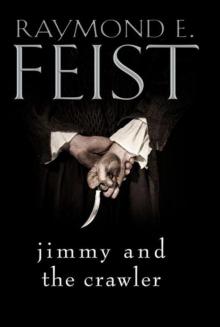 Jimmy and the Crawler
Jimmy and the Crawler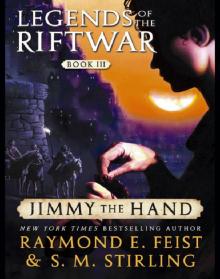 Jimmy the Hand: Legends of the Riftwar, Book 3
Jimmy the Hand: Legends of the Riftwar, Book 3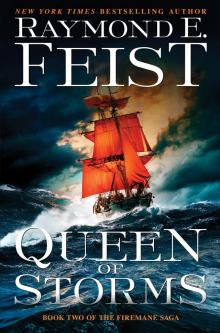 Queen of Storms
Queen of Storms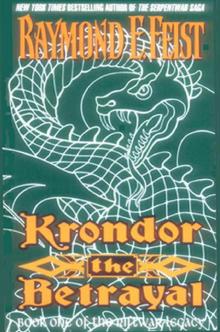 Krondor: The Betrayal
Krondor: The Betrayal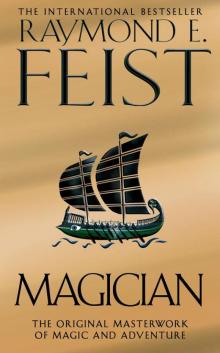 Magician
Magician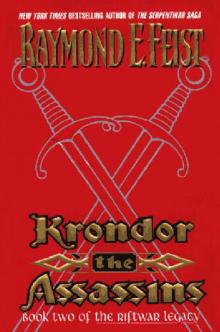 Krondor: The Assassins
Krondor: The Assassins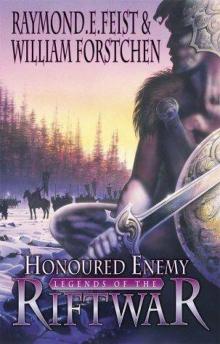 Honoured Enemy
Honoured Enemy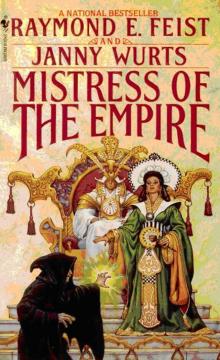 Mistress of the Empire
Mistress of the Empire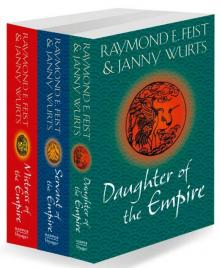 The Complete Empire Trilogy
The Complete Empire Trilogy Legends 1 - Honoured Enemy
Legends 1 - Honoured Enemy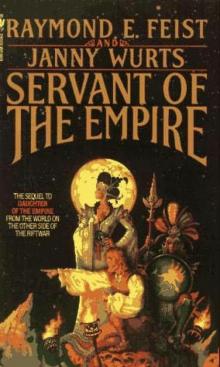 Empire - 02 - Servant Of The Empire
Empire - 02 - Servant Of The Empire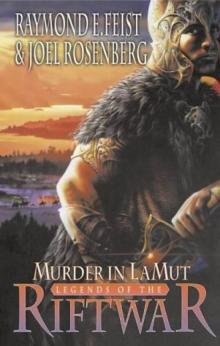 Murder In LaMut
Murder In LaMut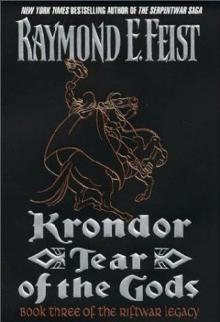 Krondor Tear of the Gods
Krondor Tear of the Gods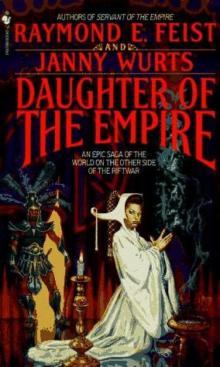 Empire - 01 - Daughter Of The Empire
Empire - 01 - Daughter Of The Empire![King of Ashes [Book One] Read online](http://i1.bookreadfree.com/i1/03/30/king_of_ashes_book_one_preview.jpg) King of Ashes [Book One]
King of Ashes [Book One]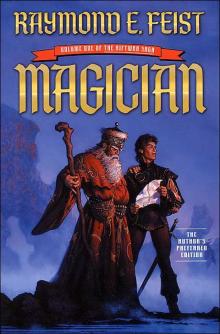 Magician (10th Aniversary Edition)
Magician (10th Aniversary Edition)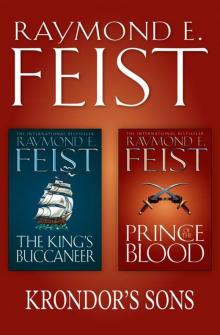 Prince of the Blood, the King's Buccaneer
Prince of the Blood, the King's Buccaneer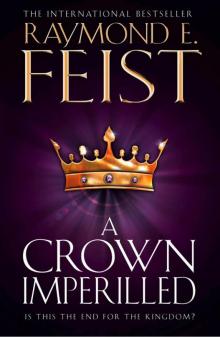 A Crown Imperilled cs-2
A Crown Imperilled cs-2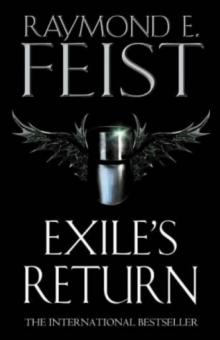 Exile's Return
Exile's Return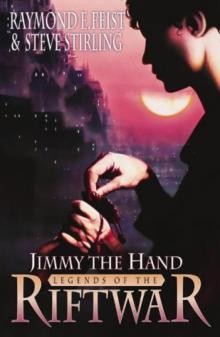 Jimmy the Hand
Jimmy the Hand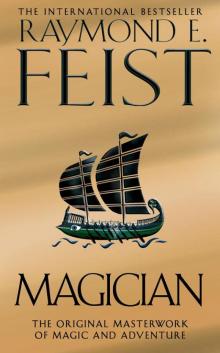 Book 1 - Magician
Book 1 - Magician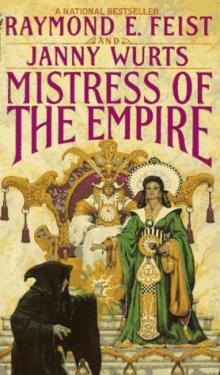 Empire - 03 - Mistress Of The Empire
Empire - 03 - Mistress Of The Empire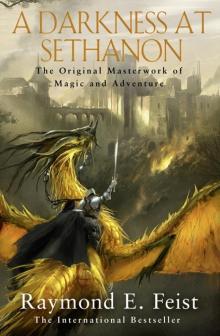 Darkness at Sethanon
Darkness at Sethanon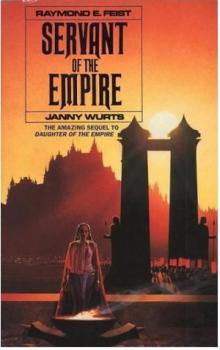 Servant of the Empire
Servant of the Empire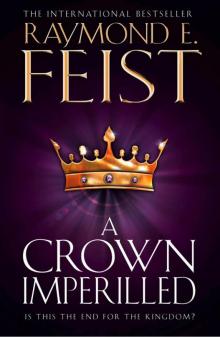 A Crown Imperilled
A Crown Imperilled Rides a Dread Legion
Rides a Dread Legion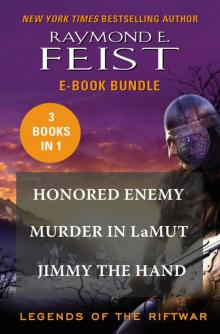 Legends of the Riftwar
Legends of the Riftwar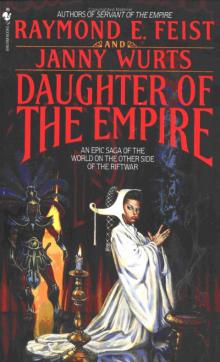 Daughter of the Empire
Daughter of the Empire The Riftwar Saga Trilogy: Magician, Silverthorn and A Darkness at Sethanon
The Riftwar Saga Trilogy: Magician, Silverthorn and A Darkness at Sethanon